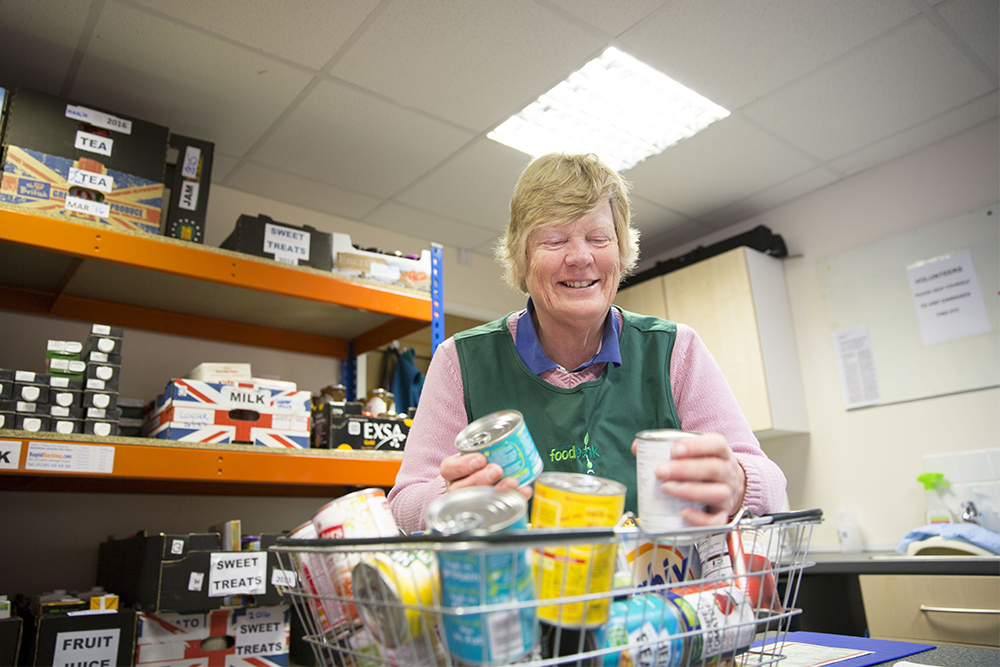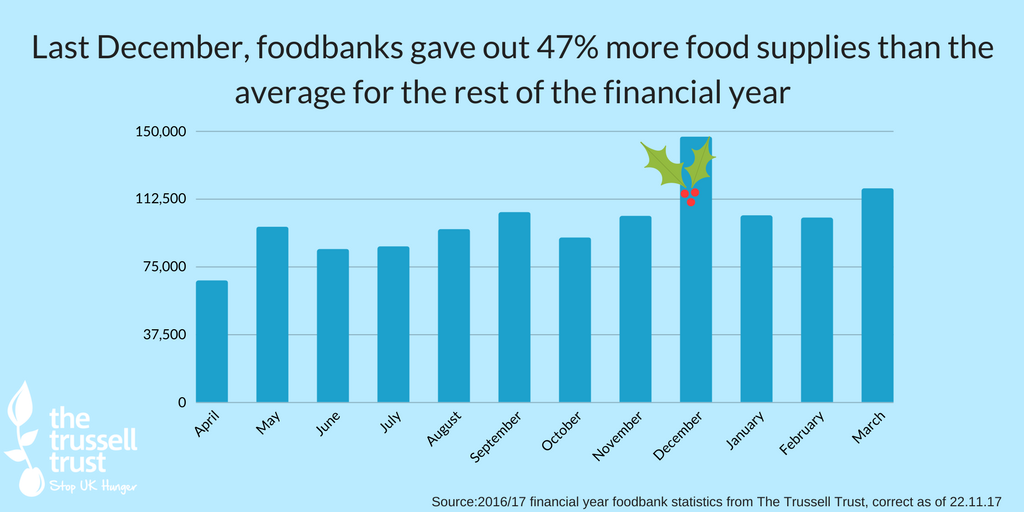- Newly released figures reveal 47% increase in number of three-day emergency supplies provided by Trussell Trust foodbanks last December compared to the monthly average for 2016/17 financial year
- Generous donations in December 2016 meant foodbanks met demand, but new data shows that there is still significant need in the following months when donations drop
- Foodbanks are doing even more to help people in crisis but charity is calling on people to support their local foodbank in December and into the New Year to make sure need is met
The Trussell Trust is calling on the public to help people facing hunger during what is expected to be their foodbank network’s busiest Christmas to date. New data released today reveals that during December 2016, The Trussell Trust’s network provided 146,798 three-day emergency food supplies to people in crisis; 61,093 of these went to children.
This a 47% increase on the monthly average of three-day emergency supplies provided in the 2016/17 financial year, which was 99,995. This means December 2016 was the busiest month for Trussell Trust foodbanks on record, but recent statistics showing a 13% in foodbank use during the first six months of this financial year suggest December 2017 will be even busier.
New data also shows that while December sees record demand, the need for foodbanks is growing and remains high through the start of the New Year into spring, when donations fall.*
Figure 1 Three-day emergency food supplies given out monthly for financial year 2016/17 (April 2016 – March 2017), with line of best fit showing that demand is growing and remains high in the months following Christmas
Generous donations from the public in December 2016 meant foodbanks met the increased need in that month, but donations in January, February and March 2017 all fell below the monthly average of 931 tonnes for the 2016-17 financial year.**
This year, foodbanks are doing even more to make sure people aren’t left hungry at Christmas. Many foodbanks will be distributing presents to make sure children have presents under the tree, whilst others will be providing special Christmas food boxes with festive food or fresh turkeys. More foodbanks than ever will be running holiday clubs and community meals for families to make sure they have a hot meal and company over the Christmas break.
Mark Ward, Interim Chief Executive said today,
“For many, this Christmas will not be a time for celebration. Every year we see a spike in demand at Christmas but this year foodbanks are expecting their busiest Christmas ever. At Christmas foodbanks will be working hard to provide not only those regular essentials, like pasta and cereal, but also little extras that offer hope at a time when people need it most. The stories are as inspiring as they are heart-breaking – one mum told us that she was relieved as her daughter’s first Christmas was taken care of with help from the foodbank.
“Last December, the public’s generosity meant foodbanks could help thousands of people across the country. But when the festive season is over there will still be people in our communities unable to afford food. Foodbanks rely on donations, which is why we’re asking the public to show that same generosity again, not only this December but in the months that follow Christmas too.”
The Trussell Trust has launched its Christmas campaign to help raise funds to support its network of foodbanks. The Trust relies on voluntary donations to help foodbanks carry out they amazing and essential work, as well as developing and implementing projects designed to tackle the underlying causes of poverty. You can donate to the campaign here.
To find information on what items of stock are most needed at individual foodbanks in The Trussell Trust’s network, find their website via https://www.trusselltrust.org/get-help/find-a-foodbank/ and click on the links to “Give help”/”Donate food”.
ENDS
Notes
*All data representing three-day emergency food supplies is a measure of volume and not unique users. As we work with a live data system, numbers will increase with time as foodbanks input more data into the system. The numbers below are accurate as of 22/11/17.
| April 2016 | 67,262 | October 2016 | 91,007 |
| May 2016 | 96,939 | November 2016 | 102,976 |
| June 2016 | 84,625 | December 2016 | 146,798 |
| July 2016 | 86,106 | January 2017 | 103,278 |
| August 2016 | 95,640 | February 2017 | 102,045 |
| September 2016 | 105,048 | March 2017 | 118,211 |
**Donations to The Trussell Trust’s foodbank network, in tonnes, month-to-month during the last financial year:
| November 2016 | 911 tonnes |
| December 2016 | 2,178 tonnes |
| January 2017 | 860 tonnes |
| February 2017 | 650 tonnes |
| March 2017 | 768 tonnes |
The Trussell Trust:
- Every day people in the UK go hungry for reasons ranging from redundancy or bereavement to welfare problems or receiving an unexpected bill on a low income. The Trussell Trust’s network of over 420 foodbanks provides three days’ emergency food and support to people in crisis across the UK.
- From April 2016 to March 2017, Trussell Trust foodbanks provided 1,182,954 three day emergency food supplies to people in crisis. Of those helped, 436,938 were for children. Trussell Trust statistics are collected using an online data collection system into which foodbanks enter the data from each foodbank voucher. The system records numbers given three-day emergency food supplies. The Trussell Trust is measuring volume – the number of people to whom it has given three days’ food supply (containing enough food for 10 meals), but these are not necessarily unique people. Find out more at https://www.trusselltrust.org/news-and-blog/latest-stats/ .
- Everyone who comes to a Trussell Trust foodbank is referred by a frontline professional agency like Citizens Advice, housing associations and children’s centres.
- Trussell Trust foodbanks do much more than food: they provide a listening ear and help resolve the underlying cause of the crisis either through signposting onto relevant local charities or providing on-site immediate support, such as holiday clubs or budgeting and cookery courses.
- Find out more at trusselltrust.org




